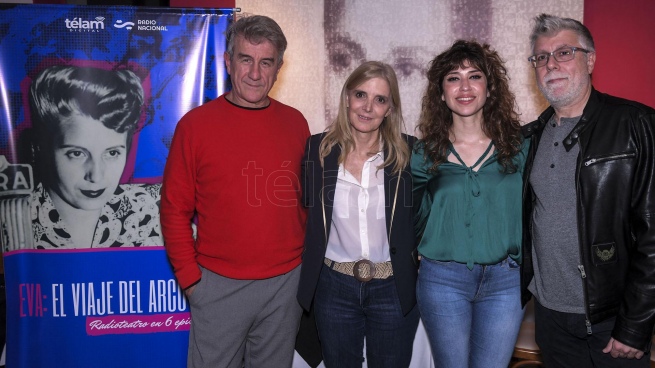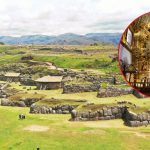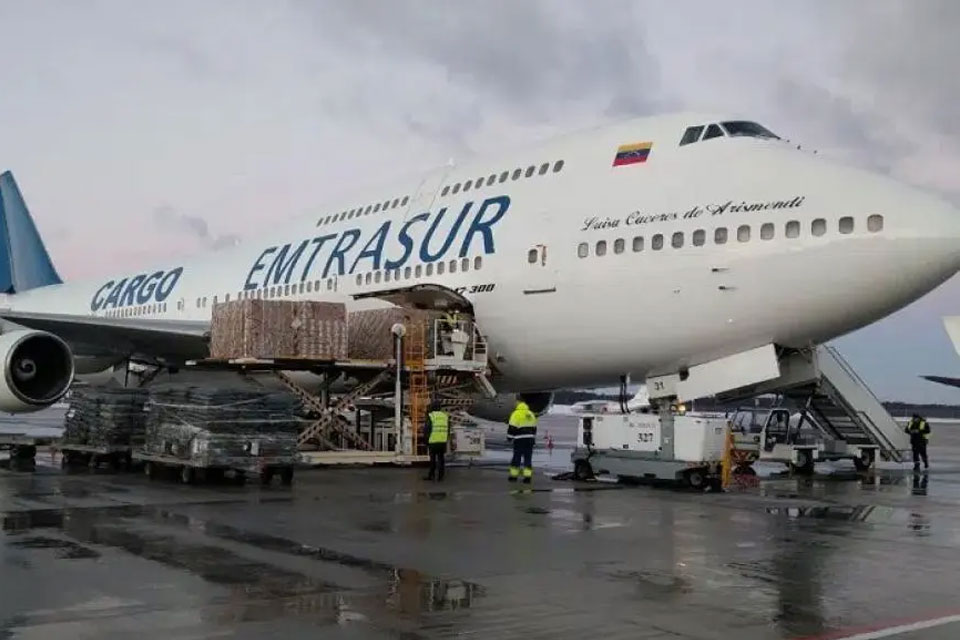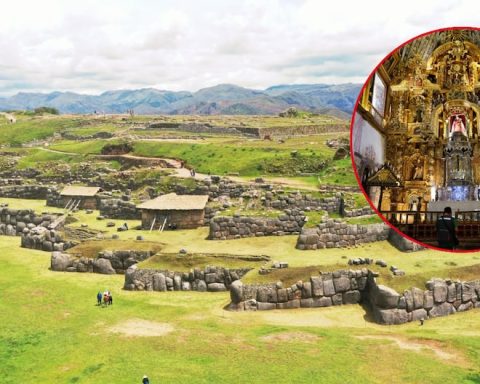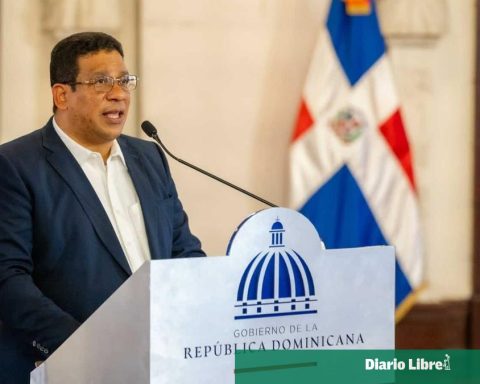The national news agency Télam and Radio Nacional presented this Monday afternoon the co-production “Eva: El viaje del arcoíris”, a radio drama based on the diplomatic mission headed by Eva Perón in Europe in 1947, written and directed by Marcelo Camaño, to vindicate his figure and legacy seventy years after his death and available from this Monday on https://www.telam.com.ar/evita-70-aniversario.
At the event, the president of Télam, Bernarda Llorente; the head of Radio and Television Argentina (RTA), Rosario Lufrano; the Minister of Women, Gender and Diversity, Elizabeth Gómez Alcorta; and the screenwriter and director Marcelo Camaño.
Eva Perón’s trip responded mainly to an invitation from the then head of the Spanish State Francisco Franco, in gratitude for the food aid that Argentina sent to Spain in post-war times.
The trip included visits to Italy and an audience with Pope Pius XII, although he also visited Portugal, France, Switzerland and, before returning to Argentina, he attended the Foreign Ministers’ Summit in Brazil.
Although the objective of that tour was to continue contributing food and raw materials to the Spanish people affected by the post-war period, seek international alliances and sign prosperous agreements for the country, it was also the opportunity for the figure of Eva to transcend borders.

During her speech, Llorente stressed that that historical moment marked a before and after in the destiny of a protagonist who “leaves like Eva and returns like Evita” to “begin to take center stage as a leader to transform that reality that has always hit her so hard and about which he has a very high sensitivity”.
In addition, the president of Télam highlighted the coordinated work between the public media, which on this occasion was expressed in “Eva: The rainbow trip” and claimed the need to “rethink the different ways of communicating to reach people”.
“It’s about speaking different languages, different languages, to be able to reach audiences across the country with different messages and, above all, with different reflections”Llorente added.
“I think that public media have never been able to do things together like never before. We know that dispersion weakens us and that union strengthens us”, he added in relation to the radio drama, which is narrated from “fiction” to “tell a reality and in the best way” guided by “love and passion” and “with the conviction that we are on the right track with public media as a transformation tool.
For Gómez Alcorta, the figure of Eva Perón “transcends” her time and her story allows multiple rereadings of current affairs: “Evita transcends and what we discover with impressive clarity is that her entire agenda is absolutely valid,” said the minister. about the mythical historical figure of Peronism who “condensed” everything that “could not or should not be a young, humble, transgressive and political woman” who returned from that diplomatic mission turned into a “leader”

Lufrano, for his part, indicated that he hopes “That the passion that Eva had” and that is reflected in this piece of radio play “can enlighten us today” because the country has “a very cyclical history: We are still discussing many of the things that we were discussing before. We continue to fight for our independence, for our economic sovereignty and we continue to work and fight for the rights of workers,” he said.
Regarding the context of this official mission in 1947, Camaño -scriptwriter and director of this production- explained to Télam that that trip was motivated by the decision of then-president Juan Domingo Perón not to validate the totalitarian government of Francisco Franco with his presence in Spain. .
“They did not want to go to Spain because Franco’s situation was a bit contradictory with a democratic government like Argentina’s but at the same time they did not want to let go of the Spanish people’s hand. And the number of things that Eva said to Franco’s face with an extreme level of danger, although protected in that presidential context because I knew that in some way I was protected, but only until then,” he explained.
For the screenwriter, one of the triggers that motivated him to make this historical cut on his political life had to do with his dialogue with current affairs: “For example, there was a sector of the opposition that was advancing in the different European capitals to complicate the panorama, putting spokes in the wheel, or the inventions of newspapers with false news”.

In addition, he stressed that during his European stay he began to shape what the future of the Eva Perón Foundation had to be, an idea that was not fully formed in his head and that he ended up closing on that trip,” he stressed.
Seventy years after his death, his figure continues to arouse both passion and hatred, because “where there is a need there is a right” and “when you create a right, there is a caste that does not want to lose privileges and feels that they are going to take away something you don’t want to share.
“Eva: the rainbow trip” describes the details and insiders of this official tour and also introduces her companionsto the historical figures with whom it was presented and describes the results of this tour crossed by the convulsive political and social climate of the postwar period.
Convinced of the success that this production will generate, the director of Radio Nacional, Alejandro Pont Lezica, celebrated the alliance of the public media to remember the legacy of Eva Perón: “A woman who pushed the limits in her time and who fought to give rise to women”.

“Today with these realities, where women are the true protagonists, having Eva as a flag is wonderful. For us at Radio Nacional we feel that Argentina is the protagonist and that in Argentina are the things that unite us and the people who have made Argentina great. And Eva, without a doubt, has left a mark and a very valuable starting point”he added.
In the cast stand out Mariú Fernández as Evita; Patricia Viggiano as Lillian Lagomarsino; Gabo Correa as General Perón; Alejandro Parker as Juan Duarte; Leo Trento as Alberto Dodero; Alejo García Pintos as Ricardo Guardo; Alejo Ortiz as Paco Munoz Aspiri; Mónica Santibáñez as Pilar Primo de Rivera; and María Fiorentino in the stories.
